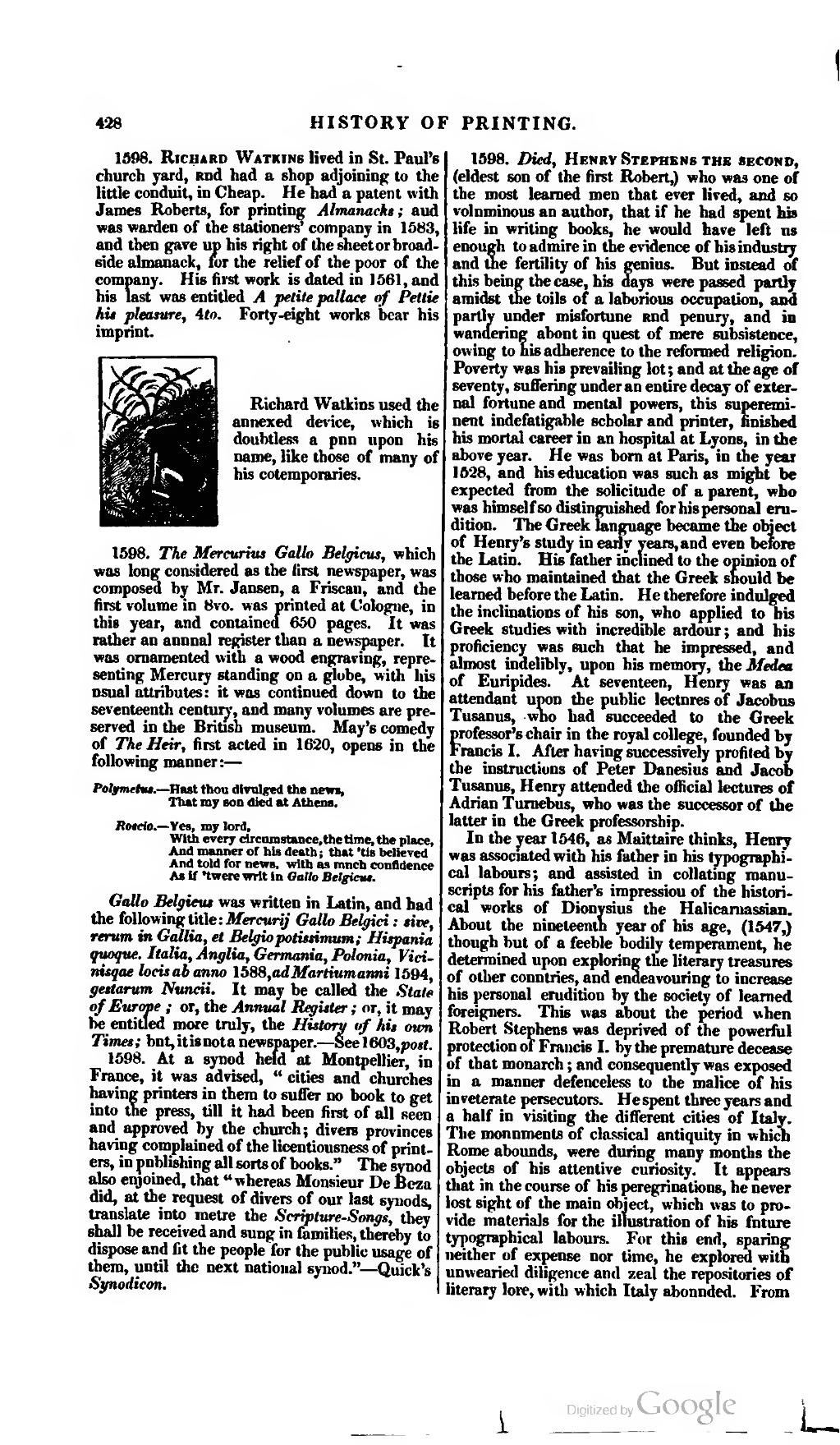438
HISTORY OF PRINTING.
1398. Richard Watkins li»ed in St. Paul's church yard, and had a shop adjoining to the little conduit, in Cheap. He had a patent with James Roberts, for printing Almanacks ; and was warden of the stationers' company in 1583, and then gare up his right of the sheet or broad- side almanack, for the relief of the poor of the company. His first work is dated in 1561, and his last was entitled A petite pallace of Petlie hit pleoiure, 4to. Forty-eight works bear his imprint.
Richard Watkins used the annexed device, which is doubtless a pun upon his name, like those of many of his cotemporaries.
1598. The JWercurius Gallo Belgicus, which was long considered as the first newspaper, was composed by Mr. Jansen, a Friscan, and the first volume in 8vo. was printed at Cologne, in this year, and contained 650 pages. It was lather an annual register than a newspaper. It was ornamented with a wood engraving, repre- senting Mercury standing on a globe, with his usual attributes : it was continued down to the seventeenth centun-, and many volumes are pre- served in the British museum. May's comedy of The Heir, first acted in 1620, opens in the following manner: —
Paljtmr<iu.— Hast thou divulged the news. That my son died at Athens.
Rotdo.— Yes, my lord.
With every clrcnnistance,the time, the place, And manner of his death ; that 'Us believed And told for news, with as much confidence As If 'twere writ in Qallo Belgieut.
Gallo Belgieut was written in Latin, and had the following title : Mercurij Gallo Befyici : rive, rerum in Gallia, et Belgiopotisamunt; Hispania quoque. Italia, Anglia, Germania, Polonia, Vici- nisqae locisabanno idS8,adMartiumanni 1694, gettamm Nuncii. It may be called the State of Ewove ; or, the Annual Register ; or, it may be entitled more truly, the History of hit own Timet ; but, it is not a newspaper. — See 1 603,port.
1598. At a synod held at Montpellier, in France, it was advised, " cities and churches having printers in them to suffer no book to get into the press, till it had been first of all seen and approved by the church ; divere provinces having complained of the licentiousness of print- ers, in publishing all sorts of books." The svnod also enjoined, that "whereas Monsieur De Beza did, at the request of divers of our last synods, translate into metre the Scripture-Songs, they shall be received and sung in families, thereby to dispose and fit the people for the public usage of them, until the next national synod." — Quick's Synodicon.
1598. Died, Henry Stephens the second, (eldest son of the first Robert,) who was one of the most learned men that ever lived, and so voluminous an author, that if he had spent his life in writing books, he would have left us enough to admire in the evidence of his industiy and uie fertility of his genius. But instead of this being the case, his days were passed partly amidst the toils of a laborious occupation, and partly under misfortune and penury, and in wandering about in quest of mere subsistence, owing to his adherence to the reformed religion. Poverty was his prevailing lot; and at the age of seventy, suffering under an entire decay of exter- nal fortune and mental powers, this supetemi- nent indefatigable scholar and printer, finished his mortal career in an hospital at Lyons, in the above year. He was born at Paris, in the year 1528, and his education was such as might be expected from the solicitude of a parent, who was himself so distinguished for his personal eru- dition. The Greek language became the object of Henry's study in early vear8,and even before the Latin. His father inclined to the opinion of those who maintained that the Greek should be learned before the Latin. He therefore indulged the inclinations of his son, who applied to bb Greek studies with incredible ardour ; and his proficiency was such that he impressed, and almost indelibly, upon his memory, the Medea of Euripides. At seventeen, Henry was an attendant upon the public lectures of Jacobus Tusanus, who had succeeded to the Greek professor's chair in the royal college, founded by Francis I. After having successively profited by the instructions of Peter Danesius and Jacob Tusanus, Henry attended the official lectures of Adrian Tumebus, who was the successor of the latter in the Greek professorship.
In the jrear 1546, as Maittaire thinks, Henry was associated with his father in his typographi- cal labours; and assisted in collating manu- scripts for his father's impression of the histori- cal works of Dionysius the Halicaruassian. About the nineteenth year of his age, (1547,) though but of a feeble bodily temperament, he determined upon exploring the literary treasures of other countries, and endeavouring to increase his personal erudition by the society of learned foreigners. This was about the period when Robert Stephens was deprived of the powerful protection of Francis I. by the premature decease of that monarch ; and consequently was exposed in a manner defenceless to the malice of his inveterate persecutors. He spent three years and a half in visiting the different cities of Italy. The monuments of classical antiquity in which Rome aboimds, were during many months the objects of his attentive curiosity. It appears that in the course of his peregrinations, he never lost sight of the main object, which was to pro- vide materials for the illustration of his future typographical labours. For this end, sparing neither of expense nor time, he explored with unwearied diligence and zeal the repositories of literary lore, with which Italy abounded. From
L,
